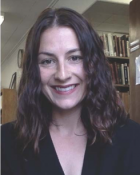
Daniela Dover

Sarah Beach
Daniela Dover, Assistant Professor of Philosophy, was interviewed by Sarah Beach. Sarah is a second-year Ph.D. student in the Department of Philosophy, specializing in meta-ethics, social and political philosophy, and feminist philosophy. This interview was conducted over email.
SB: Why philosophy?
DD: I knew I wanted to be an academic by the end of the first semester of college. As soon as I saw what it was like to be allowed to just read and write and think all day, I knew I wanted to keep doing that, if I could get away with it
SB: When did you realize you wanted to do philosophy for a living?
DD: I only got into philosophy toward the end of college. I majored in classics, focusing on 5th century Athenian authors like Thucydides and Aristophanes. I think I chose philosophy over classics largely because I liked how it wormed its way into the rest of life. Thinking about novels I read or movies I saw could count as philosophy. And I could do philosophy by having conversations with my friends. It could become continuous with everything else I cared about.
SB: Who were your favorite philosophers when you first encountered philosophy? Who are your favorites now?
DD: Spinoza was my favorite in college. Now, I’d probably say Plato. Among more recent authors, I love Iris Murdoch. My interest in philosophers tends to be inversely proportional to how much I agree with them, so the ones I love most aren’t necessarily the ones who would figure in my written work.
SB: How would you characterize your approach to doing philosophy?
DD: I keep an eye out for things that a lot of people around me seem to believe but that don’t sit well with me. Then I try to explain why these ideas bother me. I generally stick to ideas that are prevalent in the culture at large, not just in the philosophical literature. I’m not very interested in arguing against something that only philosophers believe. But I’m also not eager to come up with philosophical defenses of commonsense views. I find the way we live now deeply unsatisfactory, and philosophy for me is primarily about articulating that dissatisfaction and recruiting others to share it and to look for something better.
“I try to help students get more comfortable with “Living in the questions,” as Rilke Says, Rather than trying to settle on answers. I want philosophy to give them a sense of freedom and possibility.”
SB: And your approach to teaching?
DD: My fear is always that students will use philosophy as a tool to build sturdier defenses of what they already believe. In the aggregate, that would ensure that philosophical education is just propping up the status quo. I try to help students get more comfortable with “living in the questions,” as Rilke says, rather than trying to settle on answers. I want philosophy to give them a sense of freedom and possibility.
SB: What do you think is the most unusual or controversial philosophical claim you endorse?
DD: I’m a pacifist. It’s not something I would defend in my philosophical work, because I don’t think I could defend it on an abstract level. But it structures my thinking about a lot of things
SB: What do you work on?
DD: My current project is about the important role played by adversarial conversations in friendship and love, and about how recognizing that role might change our thinking about the self.
SB: What advice would you give to yourself as a graduate student?
DD: I wish I had spent less time trying to get myself interested in debates that ultimately bored me, just because they were currently treated as important in the field.
SB: If you could change some things about the discipline, what would they be?
DD: I would make the discipline much more diverse, both demographically and ideologically.
SB: This is a question I often get asked: what, if any, practical impact can philosophy/philosophers have on the world?
DD: The most immediately practical thing philosophy can do, in my mind, is to loosen the grip of the ideas that reinforce unjust social arrangements.
SB: What are your non-philosophical hobbies?
DD: I like spending time outdoors. Lately I am getting more into rock climbing, although it still terrifies me.
SB: What non-philosophical stuff do you read?
DD: I read novels and poetry, history, and some sociology and anthropology, when I can.
SB: A recent album, TV show, or movie you’re currently into?
DD: This isn’t recent, but the last movie I saw that really astonished me was Bela Tarr’s Werckmeister Harmonies.

